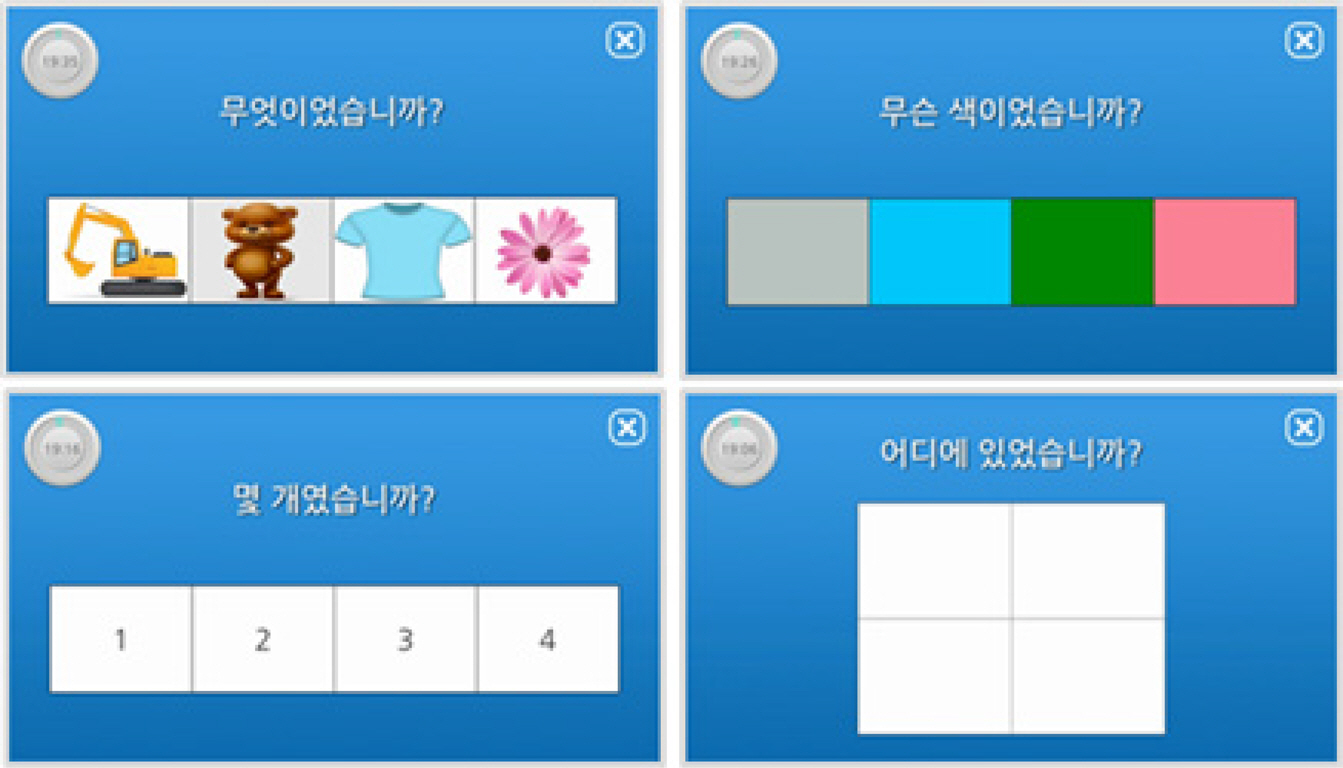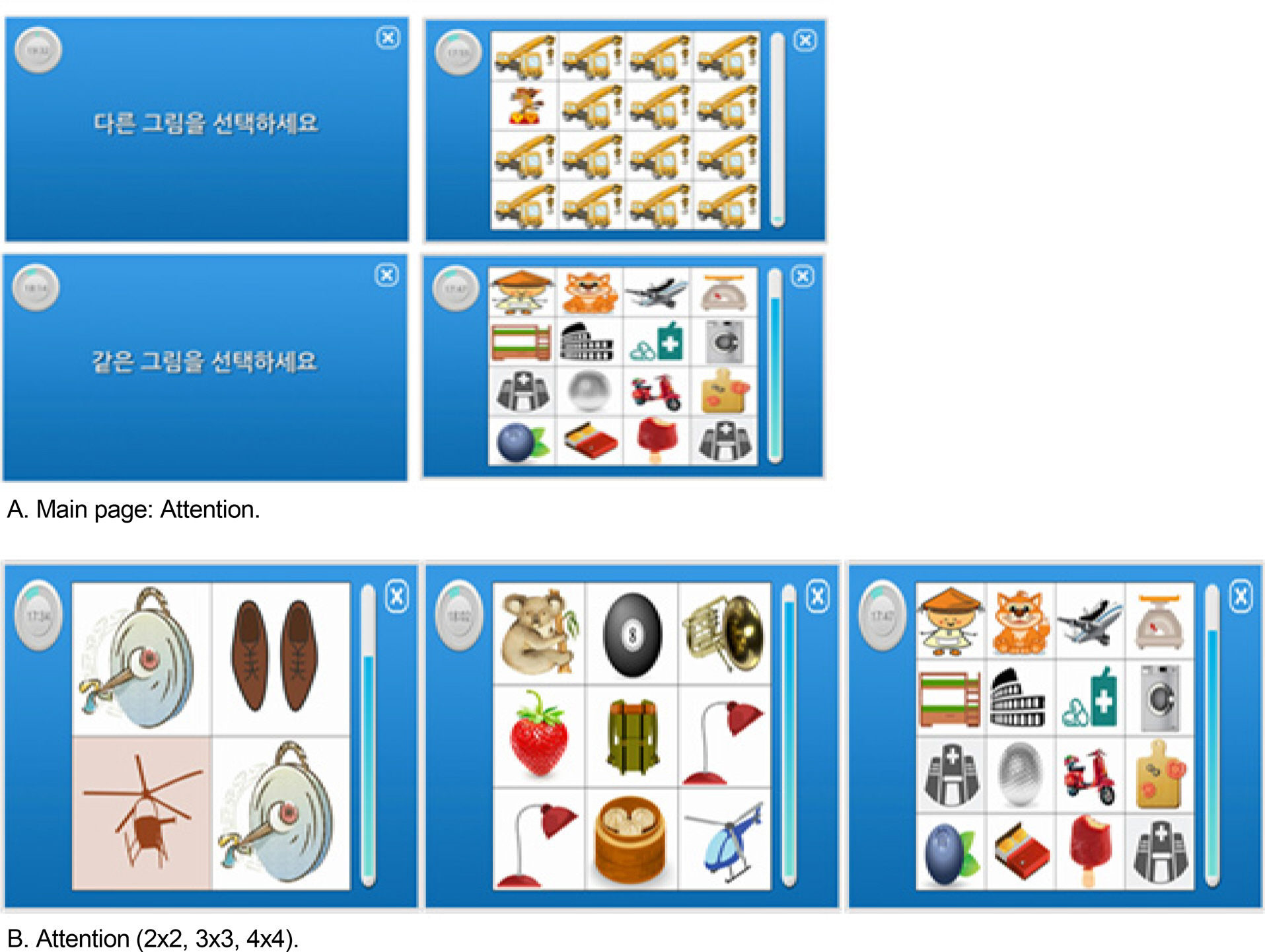Korean J Adult Nurs.
2017 Jun;29(3):266-277. 10.7475/kjan.2017.29.3.266.
Development of Mobile-application based Cognitive Training Program for Cancer Survivors with Cognitive Complaints
- Affiliations
-
- 1Department of Nursing, Sahmyook University, Seoul, Korea. kimjh@syu.ac.kr
- 2Clinical and Counseling Psychology, Graduate School of Medicine, CHA University, Seoul, Korea.
- KMID: 2406325
- DOI: http://doi.org/10.7475/kjan.2017.29.3.266
Abstract
- PURPOSE
The purpose of this study was to design a mobile-application of a cognitive training program for people who have chemo-related cognitive complaints.
METHODS
The program was developed based on the networkbased instructional system design proposed by Jung. The program consisted of several tasks centered on four cognitive domains: learning, memory, working memory, and attention. For memory learning, a target-image and all its elements (color, position, and number) were presented on the screen that had to be recognized among a number of distractor-figures. In working memory training, the previous learned target-figure according to the level of difficulty had to be remembered among many different figures. In attention training named "Find the same figure," two identical symbols in a grid-pattern filled with different images were presented on the screen, and these had to be simultaneously touched. In attention training named "Find the different figure," a different symbol in a grid pattern filled with same figures had to be selected. This program was developed to train for a minimum of 20 min/day, four days/week for six weeks.
RESULTS
This cognitive training revealed statistically significant improvement in subjective cognitive impairments (t=3.88, p=.006) at six weeks in eight cancer survivors.
CONCLUSION
This cognitive training program is expected to offer individualized training opportunities for improving cognitive function and further research is needed to test the effect in various settings.
MeSH Terms
Figure
Reference
-
1. Wefel JS, Kesler SR, Noll KR, Schagen SB. Clinical characteristics, pathophysiology, and management of noncentral nerv-ous system cancer-related cognitive impairment in adults. CA: A Cancer Journal for Clinicians. 2015; 65(2):123–38. https://doi.org/10.3322/caac.21258.
Article2. Kanaskie ML. Chemotherapy-related cognitive change: a prin-ciple-based concept analysis. Oncology Nursing Forum. 2012; 39(3):E241–8. https://doi.org/10.1188/12.ONF.E241-E248.
Article3. Park JH, Bae SH. Jung YS, Jung YM. Prevalence and characteristics of chemotherapy-related cognitive impairment in patients with breast cancer. Journal of Korean Academy of Nursing. 2015; 45(1):118–28. https://doi.org/10.4040/jkan.2015.45.1.118.4. Schagen SB, Muller MJ, Boogerd W, Mellenbergh GJ, van Dam FS. Change in cognitive function after chemotherapy: a pro-spective longitudinal study in breast cancer patients. Journal of National Cancer Institute. 2006; 98(23):1742–5. https://doi.org/10.1093/jnci/djj470.
Article5. Nelson CJ, Nandy N, Roth AJ. Chemotherapy and cognitive deficits: mechanisms, findings, and potential interventions. Palliative & Supportive Care. 2007; 5(3):273–80. https://doi.org/10.1017/S1478951507000442.
Article6. Milbury K, Chaoul A, Biegler K, Wangyal T, Spelman A, Mey-ers CA, et al. Tibetan sound meditation for cognitive dysfunction: results of a randomized controlled pilot trial. Psycho- Oncology. 2013; 22(10):2354–63. https://doi.org/10.1002/pon.3296.
Article7. Coyle H, Traynor V, Solowij N. Computerized and virtual real-ity cognitive training for individuals at high risk of cognitive decline: systematic review of the literature. The American Journal of Geriatric Psychiatry. 2015; 23(4):335–59. https://doi.org/10.1016/j.jagp.2014.04.009.
Article8. Martin M, Clare L, Altgassen AM, Cameron MH, Zehnder F. Cognition-based interventions for healthy older people and people with mild cognitive impairment. Cochrane Database of Systematic Reviews. 2011; 1:CD006220. https://doi.org/10.1002/14651858.CD006220.pub2.
Article9. Gates N, Valenzuela M. Cognitive exercise and its role in cognitive function in older adults. Current Psychiatry Reports. 2010; 12(1):20–7. https://doi.org/10.1007/s11920-009-0085-y.
Article10. Woolf CJ, Salter MW. Neuronal plasticity: increasing the gain in pain. Science. 2000; 288(5472):1765–8. https://doi.org/10.1126/science.288.5472.1765.
Article11. Kim DH, Cho YN, Kwon HC. The effect of Rehacom on cognitive function and activities of daily living for traumatic brain injury. Journal of Special Education & Rehabilitation Science. 2013; 52(1):197–216.12. Kim SY, Rhee KM. The effect of computer-based cognitive rehabilitation program on visual perception and ADL in children with intellectual disability. Journal of Rehabilitation Welfare Engineering & Assistive Technology. 2015; 9(2):105–13.13. Shim JM, Kim HH, Lee YS. Effects of computerized neurocognitive function program induced memory and attention for patients with stroke. The Journal of Korean Society of Physical Therapy. 2007; 19(4):25–32.14. Kim HJ, Yang YS, Choi KH, Kim TY. The effect of computer-based cognitive training program on cognition. Dementia and Neurocognitive Disorders. 2013; 12(4):87–93. https://doi.org/10.12779/dnd.2013.12.4.87.
Article15. Oh PJ, Kim JH. The effects of nonpharmacologic interventions on cognitive function in patients with cancer: a meta-analysis. Oncology Nursing Forum. 2016; 43(5):E205–17. https://doi.org/10.1188/16.ONF.E205-E217.
Article16. Kwon JS, Kim YG, Kim JY, Yuk JS, Cho HJ, Hong SP. Cognitive rehabilitation. Seoul: Pacific Books;2008. p. 282.17. Jung IS. Network-based instructional system design. Na IJ, editor. Understanding of distance education. Seoul: Kyoyook-book;1999. p. 77–99.18. Oh PJ, Kim IO, Shin SR, Jung HK. Development of web-based multimedia content for a physical examination and health assessment course. Journal of Korean Academy of Nursing. 2004; 34(6):994–1003.
Article19. Wagner LI, Butt Z, Sweet JJ, Cella D. Measuring patient self- reported cognitive function: development of the functional assessment of cancer therapy-cognitive function instrument. The Journal of Supportive Oncology. 2009; 7(6):W32–9.20. Park JH, Bae SH, Jung YS, Jung YM. The psychometric proper-ties of the Korean version of the functional assessment of cancer therapy-cognitive (FACT-Cog) in Korean patients with breast cancer. Supportive Care in Cancer. 2015; 23(9):2695–703. https://doi.org/10.1007/s00520-015-2632-x.
Article21. Nasreddine ZS, Phillips NA, Bédirian V, Charbonneau S, Whi-tehead V, Collin I, et al. The Montreal Cognitive Assessment, MoCA: a brief screening tool for mild cognitive impairment. Journal of the American Geriatrics Society. 2005; 53(4):695–9. https://doi.org/10.1111/j.1532-5415.2005.53221.x.
Article22. Lee JY, Lee DW, Cho SJ, Na DL, Jeon HJ, Kim SK, et al. Brief screening for mild cognitive impairment in elderly outpatient clinic: validation of the Korean version of the montreal cognitive assessment. Journal of Geriatric Psychiatry and Neurology. 2008; 21(2):104–10. https://doi.org/10.1177/0891988708316855.
Article23. Kwon JS, Kim YG, Kim JY, Yuk JS, Cho HJ, Hong SP. Cognitive rehabilitation. Seoul: Pacific Books;2008. p. 199.24. Oh PJ, Lee JR. Effect of cancer symptoms and fatigue on chemo-therapy-related cognitive impairment and depression in people with gastrointestinal cancer. Journal of Korean Academy of Nursing. 2016; 46(3):420–30. https://doi.org/10.4040/jkan.2016.46.3.420.
Article25. Fougnie D. The relationship between attention and working memory. Noah B, Johansen , editors. New research on short- term memory. New York: Nova Science Publishers;2008. p. 1–45.26. Kang MA, Baek YM. The neurocognitive function between the patients who had subjective memory impairment and mild cognitive impairment. Journal of the Korean Geriatrics Society. 2014; 18(1):7–15. https://dx.doi.org/10.4235/jkgs.2014.18.1.7.
Article27. Damholdt MF, Mehlsen M, O'Toole MS, Andreasen RK, Peder-sen AD, Zachariae R. Web-based cognitive training for breast cancer survivors with cognitive complaints-a randomized controlled trial. Psycho-Oncology. 2016; 25(11):1293–300. https://doi.org/10.1002/pon.4058.
Article28. Kesler S, Hadi Hosseini SM, Heckler C, Janelsins M, Palesh O, Mustian K, et al. Cognitive training for improving executive function in chemotherapy-treated breast cancer survivors. Clinical Breast Cancer. 2013; 13(4):299–306. https://doi.org/10.1016/j.clbc.2013.02.004.
Article29. Lampit A, Halllock H, Valenzuela M. Computerized cognitive training in cognitively healthy older adults: a systematic review and meta-analysis of effect modifiers. PLOS Medicine. 2014; 11(11):e1001756. https://doi.org/10.1371/journal.pmed.1001756.
Article
- Full Text Links
- Actions
-
Cited
- CITED
-
- Close
- Share
- Similar articles
-
- Development and effectiveness of a cognitive enhancement program based on a mobile application for preventing dementia: a study focusing on older adults who use senior citizen centers
- Developing a Mobile-Based Exercise Program to Reduce Fear of Falling
- Cognitive Rehabilitation of Brain Tumor Survivors: A Systematic Review
- Cognitive Rehabilitation of Dementia
- Efficacy of Mobile-Based Cognitive Training Program DoBrain in Preschool Children With or Without Developmental Disabilities: A Randomized, Single-Blind, Active-Controlled Trial



